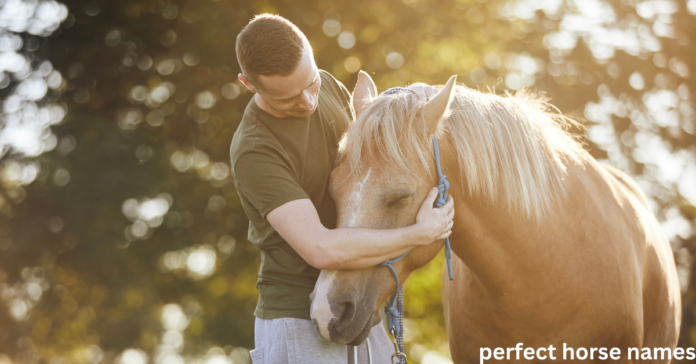If you want to develop strong relationships with your pets and livestock, then understanding animal behavior is important. It helps us to communicate better and ensures the well-being of the animals in our care. One question that often arises among horse owners is, do horses know their names?
Do Horses Know Their Names? (Step By Step Guide)
Yes, horses know their names. But, it depends on their training, individual personality traits, and environment which vary among different horses.
Understanding Horse Cognition
Basic Cognitive Abilities
Horses acquire excellent cognitive abilities. They can learn and remember tasks and even recognize human emotions. Their memory is also quite strong which allows them to remember people and other horses they’ve interacted over time.
Social Intelligence
Horses are majestic creatures with a high degree of social intelligence. They develop complicated social structures and can communicate effectively within their groups. This social intelligence also helps them to interact with humans and recognize names.
Communication with Horses
How Horses Communicate
Horses communicate primarily through their body language and vocalizations. They use their various body parts like ears, eyes, and body posture to convey messages to each other and also to humans.
Role of Human Interaction
The interaction between humans and horses can significantly influence the ability of your horse to know and respond to their names. If there are regular and positive interactions then it will be easier for your horse to respond as they are used to associating their names with good experiences.
Evidence of Name Recognition
Scientific Studies
Several studies have proved that the horses know their names. Researchers have observed that horses respond differently to their names compared to other sounds or words that indicate a level of recognition.
Anecdotal Evidence
Many horse owners and trainers have shared stories of their horses responding to their names. Also, my horses recognize their names. This supports the fact that horses do know and recognize their names.
Comparing Horses to Other Animals
Dogs and Cats
As we all know, dogs are the ones that recognize and respond to their names. As for the cats, they only recognize but not always respond. Horses fall in between cats and dogs in their level of recognition and response to their names, which depends on their training and level of interaction.
Other Farm Animals
I believe horses tend to recognize and respond to their names due to their closer relationship and more frequent interaction with humans.
Training Horses to Recognize Their Names
Methods and Techniques
The process of teaching a horse to recognize its name requires consistent reinforcement. Repeating the horse’s name when grooming, feeding, and any other enjoyable activities helps increase the connection.
Importance of Consistency
Consistency is of utmost importance in training horses. Regularly repeating his/her name positively will create an invaluable connection that makes horses more responsive towards their name.
Voice Commands and Cues
How Horses Respond to Different Commands
Horses have the capability of learning how to respond to various voice commands and cues, including clear, distinct verbal cues that differentiate among instructions.
Case Studies
Studies have illustrated their capacity for understanding and following instructions by proving that horses can respond to their names and other commands as well.
Factors Influencing Name Recognition
Individual Differences Among Horses
Just as with humans, different horses exhibit individual personalities and cognitive capabilities that vary greatly; some might learn their names quickly while others take longer.
Environmental Factors
The environment can have a big impact on whether a horse learns and recognizes his name. A calm, positive setting provides ideal conditions for learning names quickly.
Role of Positive Reinforcement
Rewards and Praise
Rewarding horses that respond positively to their name with treats, pats or kind words serves as positive reinforcement. Treats, pats or kind words all offer beneficial reinforcement.
Building a Strong Bond

Positive reinforcement helps foster a relationship between horse and handler, encouraging it to respond more readily when its name or other commands are given.
Practical Applications
Daily Handling and Management
Name recognition can be extremely valuable in the daily handling and management of horses, making tasks such as feeding, grooming, and leading the horse easier and more efficient.
Training and Performance
Training and performance settings often benefit from having horses that respond to their names; having one that does so enhances communication, and performance and ultimately enhances training processes.
Benefits of Name Recognition
Safety and Control
An intelligent horse that responds quickly and recognizes its name can improve safety and control for handlers, providing quicker means of gathering attention in various circumstances, thereby increasing overall safety.
Enhancing the Human-Horse Relationship
Name recognition strengthens the bond between horse and handler, leading to an improved and trustful relationship between them.
Misconceptions and Myths
Common Beliefs
There are various myths and misperceptions surrounding whether horses recognize their names. While some believe otherwise, both scientific evidence and anecdotal experiences suggest otherwise.
What Science Says
Scientific evidence supports the notion that horses know their names. Studies have proven they can distinguish names from other sounds and respond accordingly.
How to Test If Your Horse Knows Its Name
Simple Experiments
As soon as you call out its name, observe the horse’s response carefully to determine whether your horse recognizes it. If the horse consistently looks towards or moves toward you when called by name, chances are good it understands and recognizes itself.
Observational Techniques
Be mindful of how your horse reacts in different situations. If it responds more readily when its name is spoken than to any other word or sound, that could be an indicator that they know it!
FAQs
Conclusion
In short, horses recognize their names; the degree of recognition depends on various factors including training, environment, and individual differences. If you want to name your horse, try our Horse Name Generator. Fostering strong, positive relationships with your equine companion through consistent training techniques will aid them in recalling names more readily allowing more harmonious communications with them.



